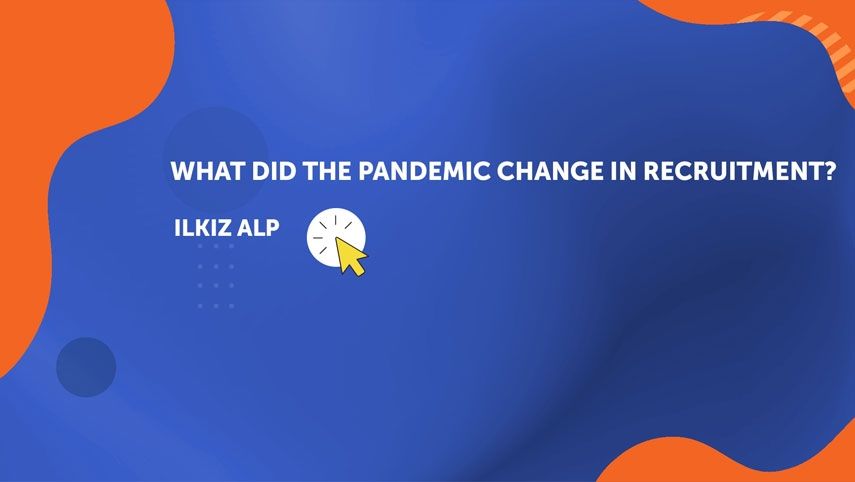What did the Pandemic Change in Recruitment?
Pandemic has become a very impactful change agent for us with the various concepts it brought to our lives like social distancing, virtual meetings and work-from-home (WFH). Of course, these changes have their reflections on recruitment. Let’s have a look at how these changes affect the actors in the sector.
Candidates
Due to the social nature of humans, it is quite difficult to adopt a full WFH model. Yet, it has already become permanent for many companies as part of a hybrid working model. This situation allows the out-of-town candidates to be considered as well. Thus, it is possible to reach a higher number of candidates easily. It means that the competition has become fiercer!
With WFH becoming permanent, the ability to work out-of-office surfaced as a new competence. Abilities to handle Internet connections, to create a work environment within the house while keeping your concentration intact and to separate your work and personal lives within the house are now sought at every level.
Another condition that WFH brings together is the ability to work more flexibly. WFH causes a shift in work-life balance of professionals. The employees try to manage various priorities at the same time, like a juggler. They might be required to work in teams which contain members in different locations or even in different time zones. Therefore, this condition requires stretching out the traditional office hours.
Apart from the working space being an actual office or home, nearly all executive search and selection companies try to perform their interviews and tests in a virtual environment. This, of course, brings together the more efficient use of candidates’ time.
The uncertainties that pandemic have brought together obliges the firms to engage in cost control. Many firms try to postpone new hires either by freezing the vacancies or double hatting the current employees. With that being said, the firms that are still hiring are seeking professionals who can undertake different tasks in the future as well, in other words they are also looking for potential. In this case, upskilling themselves would provide the candidates a competitive advantage.
Firms
We mentioned that WFH would be a permanent hybrid model in business life. Financially speaking, this new work model provides the firms huge savings on utilities, service buses, catering and many other people-related cost items. From a human resources management standpoint, WFH has tremendous benefits in ensuring lower employee turnover and higher employee efficiency because professionals who feel that their firms trust themselves to complete their tasks according to the deadlines with their own scheduling are more loyal to their firms. Undoubtedly, the success of such a work model change depends highly on the technological infrastructure of the firm. Thus, while saving from fixed office expenses, firms need to invest more in more technological aspects like remote access, mobile devices and managing cyber security.
Regardless of the continuous increase in unemployment rate in Turkey, the demand for competent and high potential white collars is still on the rise. Having experienced the social distancing and isolations with the pandemic, the white-collar professionals are prioritizing the social benefits and physical and mental health benefits more and more. Now, the content of the health insurance offered, the WFH support in terms of equipment and furniture, as well as the virtual socialization opportunities are important factors to be considered while accepting or declining an offer. This brings together for the firms the necessity to reassess the employee budgets allocations.
Another pain point for the firms is to be able to adapt the new hires, whom they have probably hired with a process mostly virtual, to corporate culture, namely the orientation process. The standard tools like onboarding activities, the apprenticing with a similar position in another location or the “buddy” system are impossible today. These constraints set a problem for HR departments. At times where traditional orientation processes cannot be run, the best solution for the professionals to perform in their new posts turns out to be “on-board coaching”.
As Ageo International, we facilitate the adaptation processes of newly hired executives with our professional coaches and support them in their fast adaptation to corporate culture.
Executive Search and Selection Companies
In order to manage various priorities like ensuring the health of firm executives, candidates and consultants, measuring the needed competencies and potentials of the firms while assuring the candidates get to know their potential employers, we became acquainted with WFH applications, virtual office tools, virtual hiring methodologies, etc. Now, all of us are experts on online interviewing techniques and meeting tools. Character and competency inventories have been indispensable for us for a long time. With the pandemic, we are compensating for the lack of analyses that could have been performed in face-to-face interviews with the psychometric applications within the process. We obtained highly impactful results in identifying professionals who can work collaboratively and thus in creating effective teams thanks to the Enneagram methodology we utilized.
Remote interviewing and competency measurement systems set us apart from our competitors and contributed to us reaching a wider pool of candidates within a shorter time span.
Pandemic has diverse effects on each sector. Possessing in-depth knowledge on changes in our customers’ day-to-day business lives and on their opportunities and threads, enables us to direct them to the right candidates, right positions, right benefit packages and right timings. Together with Intersearch Worldwide Sectoral Practice Groups, we master the sectoral dynamics on a global scale, inform our customers regarding the latest trends and continuously refresh the competency sets we seek in new candidates.
